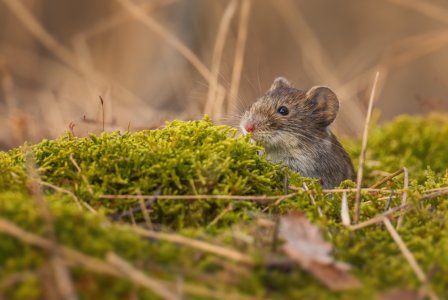Do orgasms foster lasting relationships? Study weighs in
By
Seia Ibanez
- Replies 5
The secret to a lasting relationship might be more exciting than you think.
According to recent scientific research, orgasms can rewire the brain in ways that foster long-term bonding between partners.
This discovery could revolutionise our understanding of sexual relationships and their role in human connection.
The study, published in the journal eLife, was conducted by researchers at The University of Texas at Austin (UT Austin) and Cold Spring Harbour Laboratory.
They used prairie voles as subjects for this experiment, and they observed the voles during three stages of courtship: mating, bonding, and 'ongoing bond maintenance’.
They found that 68 different brain regions underwent significant changes during these stages, rewiring and forming new connections.
The most pronounced changes occurred when the male voles experienced an orgasm.
This finding suggested that orgasms may play a crucial role in promoting connection beyond just sex, a theory that scientists believe could also apply to humans.
'The brain and behaviour data suggest that both sexes may be having orgasm-like responses, and these “orgasms” coordinate the formation of a bond,' said study author Steven Phelps, Professor of Integrative Biology at UT Austin.
'If true, it would imply that orgasms can serve as a means to promote connection, as has long been suggested in humans.'
The researchers also found that the more the male voles orgasmed, the more profound the brain rewiring was in both males and females.
This suggested that the frequency of male orgasms could significantly influence the strength of the bond between partners.
However, they could not determine when or whether the females orgasmed.
Scientists became interested in using prairie voles because they help understand how the brain deals with relationships. Thus, scientists use these animals to learn about sticking with one partner.
Studies have found that both prairie voles and humans produce oxytocin, often called the 'love hormone'.
Oxytocin is known to play a crucial role in bonding between romantic partners and mothers and their children.
In the study, the researchers started with wild-caught voles that had never mated, ensuring their brains were sexually 'blank slates’.
The researchers gave the female voles a hormone injection to ensure they were in heat before pairing them with the males.
After pairing up the voles, they carefully observed their behaviour, recording everything from mating to grooming to orgasming.
The voles were then euthanised after ten weeks, and their brains were preserved for further study.
Using light-sheet fluorescence microscopy (LSFM) imaging, the researchers examined the vole brains after forming pair bonds.
They found that many areas involved in bonding were not previously known to be associated with sex and bonding.
'That was a surprise,' Phelps said.
'Sex hormones like testosterone, estrogen, and progesterone are important for sexual, aggressive, and parental behaviours, so the prevailing hypothesis was that brain activity during mating and bonding would also be different between the sexes.'
Speaking of orgasm, studies have shown that during heterosexual encounters, women have fewer orgasms than men.
Laurie Mintz, Emeritus Professor of Psychology at the University of Florida, discussed the reason why this ‘orgasm gap’ happens and how to improve women’s sexual experiences. You can read more about it here.

What are your thoughts on this research, members? Let us know in the comments below!
According to recent scientific research, orgasms can rewire the brain in ways that foster long-term bonding between partners.
This discovery could revolutionise our understanding of sexual relationships and their role in human connection.
The study, published in the journal eLife, was conducted by researchers at The University of Texas at Austin (UT Austin) and Cold Spring Harbour Laboratory.
They used prairie voles as subjects for this experiment, and they observed the voles during three stages of courtship: mating, bonding, and 'ongoing bond maintenance’.
They found that 68 different brain regions underwent significant changes during these stages, rewiring and forming new connections.
The most pronounced changes occurred when the male voles experienced an orgasm.
This finding suggested that orgasms may play a crucial role in promoting connection beyond just sex, a theory that scientists believe could also apply to humans.
'The brain and behaviour data suggest that both sexes may be having orgasm-like responses, and these “orgasms” coordinate the formation of a bond,' said study author Steven Phelps, Professor of Integrative Biology at UT Austin.
'If true, it would imply that orgasms can serve as a means to promote connection, as has long been suggested in humans.'
The researchers also found that the more the male voles orgasmed, the more profound the brain rewiring was in both males and females.
This suggested that the frequency of male orgasms could significantly influence the strength of the bond between partners.
However, they could not determine when or whether the females orgasmed.
Scientists became interested in using prairie voles because they help understand how the brain deals with relationships. Thus, scientists use these animals to learn about sticking with one partner.
Studies have found that both prairie voles and humans produce oxytocin, often called the 'love hormone'.
Oxytocin is known to play a crucial role in bonding between romantic partners and mothers and their children.
In the study, the researchers started with wild-caught voles that had never mated, ensuring their brains were sexually 'blank slates’.
The researchers gave the female voles a hormone injection to ensure they were in heat before pairing them with the males.
After pairing up the voles, they carefully observed their behaviour, recording everything from mating to grooming to orgasming.
The voles were then euthanised after ten weeks, and their brains were preserved for further study.
Using light-sheet fluorescence microscopy (LSFM) imaging, the researchers examined the vole brains after forming pair bonds.
They found that many areas involved in bonding were not previously known to be associated with sex and bonding.
'That was a surprise,' Phelps said.
'Sex hormones like testosterone, estrogen, and progesterone are important for sexual, aggressive, and parental behaviours, so the prevailing hypothesis was that brain activity during mating and bonding would also be different between the sexes.'
Speaking of orgasm, studies have shown that during heterosexual encounters, women have fewer orgasms than men.
Laurie Mintz, Emeritus Professor of Psychology at the University of Florida, discussed the reason why this ‘orgasm gap’ happens and how to improve women’s sexual experiences. You can read more about it here.
Key Takeaways
- Orgasms have been discovered to rewire the brain to promote long-term bonding between partners, based on research conducted on prairie voles.
- Significant changes in brain connectivity were observed during the mating, bonding, and ongoing bond maintenance stages, with the most pronounced changes occurring when the male vole experienced an orgasm.
- By mapping the brains of voles, the study suggested that sexual activity is an important aspect of forming a lasting pair bond, which could increase the chances of survival for a bonded pair's offspring.
- Despite expectations that sex hormones would lead to significant differences, no major differences were found between the brains of male and female voles after bonding, suggesting that many brain areas that were not previously linked to it change during bonding.
Last edited:









